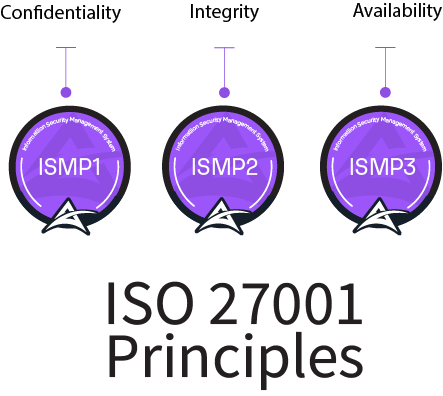
About Information Security Management System
ISO 27001 Certification, also known as ISMS Certification or Cyber Security Certification, assists organizations in managing valuable assets like financial data, intellectual property, employee information, and other critical data. This certification ensures that organizations have robust systems and procedures in place to protect these assets from cyber threats and unauthorized access.
By obtaining ISO 27001 Certification, organizations demonstrate their commitment to maintaining high standards of information security and safeguarding sensitive information from potential risks and breaches.
Axipro offers a comprehensive service centered around ISO 27001, also referred to as ISO/IEC 27001. This globally recognized methodology is dedicated to information security and its associated risk management processes.
Our service involves implementing the requirements outlined by ISO 27001 for an Information Security Management System (ISMS). This structured approach is a collaborative effort between the International Organisation for Standardization (ISO) and the International Electrotechnical Commission (IEC).
At Axipro, we understand the critical importance of managing data and information within your organization to ensure compliance with industry regulatory bodies. We assist you in fulfilling your responsibility as custodians of data, thereby making a significant impact on the confidence and trust that your customers, partners, and the industry at large place in your business
Information Security Management System Principles


Focus of Information Security Management System
- ISO 27001 framework and Cyber Security Advisory help with ISMS Certification.
- ISO 27001 training involves:
- Defining a security policy to manage.
- Confirming the scope of your ISMS to manage that policy.
- Performing a risk assessment analyzing your current systems and processes.
- Determining how to manage the risks identified during assessment.
- Creating controls to mitigate identified risks and implementing them.
- Publishing applicability criteria to ensure correct usage of controls.
Benefits of Information Security Management System

Cyber Security Certification (ISO 27001) process:
Mitigates the risk of cyber attacks by ensuring effective security systems.
Ensures the efficacy of risk management systems.
Effective data protection instills confidence from stakeholders.
Minimizes opportunities for non-compliance with regulatory bodies or laws.
Reduces negative financial impacts from information system failures.
ISO 27001 is an international standard for information security.
It helps organizations manage and protect their valuable information assets.
By following ISO 27001 standards, organizations can improve their security posture and mitigate various risks associated with cyber threats and data breaches.
Compliance with ISO 27001 demonstrates a commitment to information security and enhances trust with customers and stakeholders

Frequently Asked Questions
ISO/IEC 27001 is an international standard that specifies the requirements for an Information Security Management System (ISMS)12. An ISMS is a systematic approach to managing information security and protecting information assets314. The standard helps organizations implement, monitor, maintain, and continually improve their information security practices124. The standard also helps organizations build resilience, manage risk, and ensure customer and stakeholder confidentiality
ISO/IEC 27001 is the world’s best-known standard for Information Security Management Systems (ISMS). It defines requirements that an ISMS must meet, helping organizations manage risks related to the security of data they own or handle. Here are some key points about ISO/IEC 27001: Purpose: ISO/IEC 27001 aims to protect three aspects of information: Confidentiality: Ensuring only authorized individuals can access information. Integrity: Allowing only authorized changes to information. Availability: Ensuring information is accessible when needed. Benefits: Resilience to Cyber Attacks: Helps organizations become risk-aware and proactively identify weaknesses. Preparedness for New Threats: Promotes a holistic approach to information security, vetting people, policies, and technology. Data Integrity, Confidentiality, and Availability: Ensures robust security practices across all supports. Implementation: Organizations establish, implement, maintain, and continually improve an ISMS based on ISO/IEC 27001. The system manages risks related to data security and adheres to best practices and principles defined in the standard
ISO 27001 training is beneficial for a wide range of professionals across various industries who are involved in managing or overseeing information security within their organizations. This includes but is not limited to IT managers, security professionals, compliance officers, risk managers, business continuity managers, and executives responsible for ensuring the confidentiality, integrity, and availability of sensitive information. Additionally, individuals seeking to enhance their career prospects in the field of information security or those tasked with leading their organization’s ISO 27001 certification efforts can greatly benefit from undergoing this training.
Preparing for a cybersecurity certification exam requires a structured approach and dedication to mastering the relevant content. Begin by familiarizing yourself with the exam objectives and blueprint provided by the certification body, which outline the topics and domains covered in the exam. Utilize study materials such as official certification guides, practice exams, and online courses to supplement your learning and reinforce key concepts. Establish a study schedule that allows for regular review and practice sessions, and consider joining study groups or online forums to engage with peers and share insights. Lastly, simulate exam conditions by taking timed practice tests to build confidence and identify areas for further improvement before the actual exam.
Selecting the right ISO 27001 training provider is crucial to ensure a high-quality learning experience and maximize the benefits of the training program. When evaluating potential training providers, consider factors such as their reputation and credibility in the field of information security, the qualifications and experience of their instructors, the comprehensiveness of their training curriculum, and the flexibility of their delivery options. Additionally, seek feedback from past participants or client testimonials to gauge the effectiveness and relevance of the training programs offered by the provider. Furthermore, verify whether the training provider is accredited by recognized organizations or certification bodies, as this can validate the quality and relevance of their training offerings.


